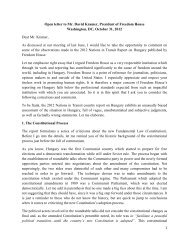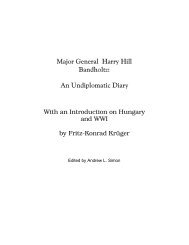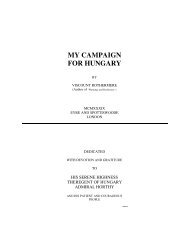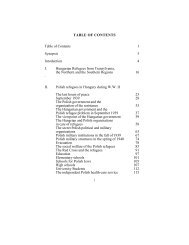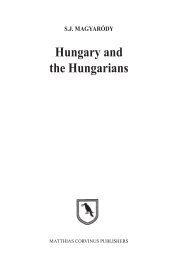The Fate of Western Hungary 1918-1921 - Corvinus Library ...
The Fate of Western Hungary 1918-1921 - Corvinus Library ...
The Fate of Western Hungary 1918-1921 - Corvinus Library ...
Create successful ePaper yourself
Turn your PDF publications into a flip-book with our unique Google optimized e-Paper software.
Hungarian Cabinet meeting, that under the terms <strong>of</strong> the Saint-Germain and<br />
Trianon treaties, it was to be the recipient <strong>of</strong> <strong>Western</strong> <strong>Hungary</strong>. Chancellor<br />
Michael Mayr informed the Foreign Committee <strong>of</strong> the Austrian government <strong>of</strong><br />
it and added: the Czechoslovak and South Slav governments <strong>of</strong>fered military<br />
assistance to help take control over the area, and rejected the plebiscite once<br />
again suggested by <strong>Hungary</strong>. 236<br />
<strong>The</strong> January 13 note <strong>of</strong> <strong>Hungary</strong> – authoritatively worded, legally based on<br />
the Millerand letter and extensively reasoned – was answered on January 27<br />
when the president <strong>of</strong> the Council <strong>of</strong> Ambassadors, Jules Cambon, handed<br />
Hungarian chargé d’affaires in Paris, Iván Praznovszky, its reply. <strong>The</strong> tone <strong>of</strong><br />
the note made it clear that the Peace Conference retreated because it fell into a<br />
trap <strong>of</strong> its own making by the promises contained in the Millerand letter, its<br />
own creation. It no longer demanded the Hungarian government’s immediate<br />
handover <strong>of</strong> <strong>Western</strong> <strong>Hungary</strong> to the Entente Mission in Sopron. In fact, it<br />
stated the Great Powers wished direct discussions between the Hungarian and<br />
Austrian governments regarding the <strong>Western</strong> <strong>Hungary</strong> question. Thus, <strong>of</strong>ficial<br />
Hungarian-Austrian talks were held in Vienna on February 23 and 24. <strong>The</strong><br />
Hungarian delegation tried to convince the Austrian party that the Hungarian<br />
solution to the question, i.e.- retaining the current millennial border, was in the<br />
interest <strong>of</strong> Vienna. East <strong>of</strong> it, no better natural geographic line could be found.<br />
<strong>The</strong> Hungarian government alluded to the already noted Millerand letter; the<br />
Austrian government alluded to the complete harmonization <strong>of</strong> the Saint-<br />
Germain and Trianon treaties.<br />
<strong>The</strong> fourth Hungarian-Austrian meeting took place in Budapest on March<br />
19, where the Hungarian government – reviewing its earlier position – came<br />
forward with a suggestion which, “given Austria’s understandable and<br />
economically justified claims is, at the same time, acceptable to the local<br />
population.” <strong>The</strong> Austrian delegation rejected the proposal. In April, their<br />
proposition was to annex the economically ‘active’ Moson County to Austria,<br />
leaving the ‘passive’ Vas County with <strong>Hungary</strong> and that the two countries split<br />
Sopron County, lying between the two. 237<br />
This was also the time <strong>of</strong> the first royal coup d’état 238 attempt. Charles IV <strong>of</strong><br />
the House <strong>of</strong> Habsburg 239 crossed the Austrian-Hungarian border on March 26,<br />
<strong>1921</strong> at Pinkafő. Around midnight, he reached the bishop’s palace in<br />
Szombathely, to meet the Catholic prelate, Count János Mikes. His goal was to<br />
regain the Hungarian throne, based on his Eckartsau proclamation. At the time<br />
<strong>of</strong> his arrival, József Vass (1877-1930), prelate and Minister <strong>of</strong> Education,<br />
‘happened’ to be in the city. Prime Minister Pál Teleki and the American High<br />
236 Fogarassy, 1971, op. cit., p. 299.<br />
237 Soós, 1971, op. cit., pp. 125-126.<br />
238 IV. Károly visszatérési kísérletei [Charles IV’s return attempts]. I. füzet. Kiadja a<br />
Magyar Kir. Minisztérium. Budapest. <strong>1921</strong>, pp. 8-29.<br />
239 As noted earlier, Charles IV announced the suspension <strong>of</strong> his regal rights as ruler <strong>of</strong><br />
<strong>Hungary</strong> in Eckartsau on November 13, <strong>1918</strong>.<br />
99




